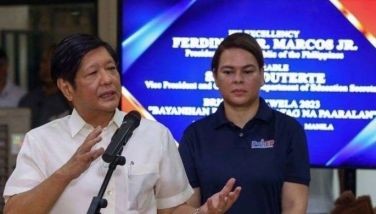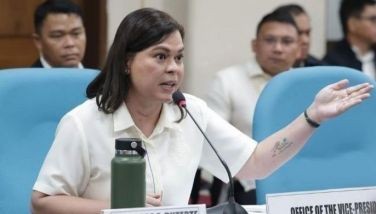US stand on the Philippine crisis vague
July 25, 2005 | 12:00am
Finding out or reading how the United States of America stands on the current political crisis is like reading tea leaves. You will never catch the US ambassador in Manila taking sides on the question of whether or not the former colonial master wants GMA to stay or resign.
On dealings with its former colony, the United States has mastered the art of ambiguity. When an American envoy talks to the press about the present situation, he lectures with clarity on American political philosophy. But, believe me, he won't commit his government to any particular regime, whether of GMA or of the successor government.
That is why when Ambassador Francis Ricciardone or the current chief of mission, Mussomeli, talk about the Philippine crisis, they will refer to the US fidelity to democratic principles which, they would insist, are shared by both countries. "We support the process and not the outcome" they will invariably say, in reply to the question on what is the best mode of ousting a sitting president. American diplomats are masters of contortion.
That is why even seasoned political observers in Manila don't know where the star-spangled banner flies. Does it fly in the opposition coalition or in the premises of the administration?
On that critical Friday when Cory Aquino, the Liberal Party, the Makati Business Club and the Hyatt Ten (the ten cabinet members who resigned) announced their breakaway from President GMA, many thought the move had the imprimatur of the Americans. The first and the last blow, said the analysts, who thought the president would have no choice but to give in that day, given the American juggernaut.
The common thinking then was that the Americans had shifted its support to the other side led by former president Cory. After all, in the mind of many people, EDSA 1 that eventually installed Cory, was partly nurtured by the US government with the support of the Catholic leadership.
But the story did not end there. Also on that Friday, former president Fidel Ramos went to the Palace to pledge his support to President GMA. This move destroyed the momentum of the breakaway group. To many people, FVR has close connections with Washington and the military in the Philippines. All of a sudden, people begun talking about GMA succeeding in dividing America!
The situation seems to be on a standoff as far as the American opinion is concerned. Since, we cannot get anything from official America, we might as well consult unofficial America. We refer to the opinion of Heritage Foundation, the think tank of the US conservatives. Its stand may be revealing of the future US stand.
Heritage Foundation, through US expert on Asia Dana Dillon, says the United States should be very careful about dealing with the Philippine political situation and should not meddle in its internal affairs. At best, it should support constitutional reforms.
Heritage thinks that the US should help resolve the conflict in the Philippines so that it could implement two of its most important goals in the region and in RP: fighting terrorism and encouraging economic development.
Heritage confirms the view expressed among some circles in the Philippines on why the US seems to be critical of the Arroyo government. One is the policy of the president to withdraw Philippine troops from Iraq when a Filipino was abducted there. The other has something to do with the President's policy of encouraging cordial relations with the People's Republic of China.
I suppose the Arroyo government has explained these policies to the US government, especially the China Card issue which is being used to isolate the President from Washington.
That is why the US appears to be neutral in the current political conflict. I believe that the US policy in the Philippines, with reference to the political forces at play, is: "May the best man win." Unlike in the case of Marcos , the US won't lift a finger to help one faction against the other.
General Danny Lim speaks
General Danny Lim, the legendary founder of the Young Officers Union, has spoken. He calls on the brass to listen to the troops.
That is not a new message. But coming from General Lim, now commander of the Scout Rangers, it is an important message. He says this at a time when the military is undergoing political pressures from both the administration and the opposition camps.
On dealings with its former colony, the United States has mastered the art of ambiguity. When an American envoy talks to the press about the present situation, he lectures with clarity on American political philosophy. But, believe me, he won't commit his government to any particular regime, whether of GMA or of the successor government.
That is why when Ambassador Francis Ricciardone or the current chief of mission, Mussomeli, talk about the Philippine crisis, they will refer to the US fidelity to democratic principles which, they would insist, are shared by both countries. "We support the process and not the outcome" they will invariably say, in reply to the question on what is the best mode of ousting a sitting president. American diplomats are masters of contortion.
That is why even seasoned political observers in Manila don't know where the star-spangled banner flies. Does it fly in the opposition coalition or in the premises of the administration?
On that critical Friday when Cory Aquino, the Liberal Party, the Makati Business Club and the Hyatt Ten (the ten cabinet members who resigned) announced their breakaway from President GMA, many thought the move had the imprimatur of the Americans. The first and the last blow, said the analysts, who thought the president would have no choice but to give in that day, given the American juggernaut.
The common thinking then was that the Americans had shifted its support to the other side led by former president Cory. After all, in the mind of many people, EDSA 1 that eventually installed Cory, was partly nurtured by the US government with the support of the Catholic leadership.
But the story did not end there. Also on that Friday, former president Fidel Ramos went to the Palace to pledge his support to President GMA. This move destroyed the momentum of the breakaway group. To many people, FVR has close connections with Washington and the military in the Philippines. All of a sudden, people begun talking about GMA succeeding in dividing America!
The situation seems to be on a standoff as far as the American opinion is concerned. Since, we cannot get anything from official America, we might as well consult unofficial America. We refer to the opinion of Heritage Foundation, the think tank of the US conservatives. Its stand may be revealing of the future US stand.
Heritage Foundation, through US expert on Asia Dana Dillon, says the United States should be very careful about dealing with the Philippine political situation and should not meddle in its internal affairs. At best, it should support constitutional reforms.
Heritage thinks that the US should help resolve the conflict in the Philippines so that it could implement two of its most important goals in the region and in RP: fighting terrorism and encouraging economic development.
Heritage confirms the view expressed among some circles in the Philippines on why the US seems to be critical of the Arroyo government. One is the policy of the president to withdraw Philippine troops from Iraq when a Filipino was abducted there. The other has something to do with the President's policy of encouraging cordial relations with the People's Republic of China.
I suppose the Arroyo government has explained these policies to the US government, especially the China Card issue which is being used to isolate the President from Washington.
That is why the US appears to be neutral in the current political conflict. I believe that the US policy in the Philippines, with reference to the political forces at play, is: "May the best man win." Unlike in the case of Marcos , the US won't lift a finger to help one faction against the other.
General Danny Lim, the legendary founder of the Young Officers Union, has spoken. He calls on the brass to listen to the troops.
That is not a new message. But coming from General Lim, now commander of the Scout Rangers, it is an important message. He says this at a time when the military is undergoing political pressures from both the administration and the opposition camps.
BrandSpace Articles
<
>
- Latest
- Trending
Trending
Latest
Recommended



























